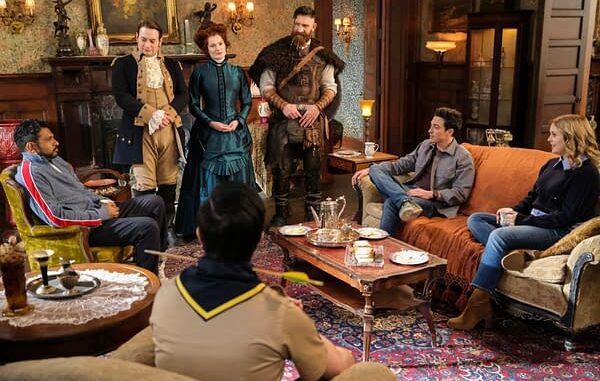
The Lingering Regret: Kyle and the Unpacking of the Ghosts Finale
The ghostly sitcom "Ghosts" has built its charm on the quirky, often hilarious, interactions between the spectral residents of Woodstone Manor. Among them, Kyle, the Pantless Wonder, stands out as a perpetual cautionary tale of youthful indiscretion. Season 4, Episode 21, "The Owl," served as a compelling finale, not just for the season but perhaps for Kyle's entire arc, forcing him to confront the deeply ingrained regret that defines his afterlife. While the episode juggled several plotlines, including Sam and Jay's financial woes and the looming threat of the mansion's sale, Kyle's journey was undeniably the emotional heart of the piece, revealing that sometimes, the ghosts we bury are the ones we need to exhume.
Kyle, ever the eager-to-please himbo, is perpetually trapped in the mindset of a college freshman trying to impress. His death, a mortifying tale of drunkenly falling out of a window during a party, hangs over him like a damp, ill-fitting toga. Throughout the series, he's used humor as a defense mechanism, deflecting genuine emotion with self-deprecating jokes and desperately seeking validation from the living, especially Sam. However, "The Owl" forces him to confront the core of his unhappiness: the wasted potential of his life and the pain he inflicted on his parents.
The catalyst for Kyle's emotional reckoning is the discovery of a box of his belongings. This seemingly innocuous event triggers a wave of introspection. Among the artifacts are reminders of his former aspirations: a meticulously crafted (albeit unfinished) birdhouse, a yearbook filled with hopeful messages, and photographs showcasing a young man brimming with life. Suddenly, Kyle isn't just the punchline of a humiliating death; he's a fully realized individual whose life was tragically cut short.
The brilliance of the episode lies in its subtle exploration of regret. Kyle doesn't embark on a dramatic, tear-filled confession. Instead, he grapples with the feeling that he could have been more, done more, and ultimately, made his parents prouder. The birdhouse, a symbol of his youthful ambition, becomes a tangible representation of his unrealized potential. His attempts to finally complete it, fueled by a renewed sense of purpose, are both heartwarming and heartbreaking. He enlists the help of the other ghosts, each bringing their own unique (and often unhelpful) skills, highlighting the communal support system that Woodstone has become.
Furthermore, the episode subtly explores the impact of Kyle's actions on his parents. While we never see them directly, their absence is palpable. His death left a gaping hole in their lives, and Kyle is acutely aware of the pain he caused. This realization motivates him to seek closure, not necessarily through direct communication (which is impossible), but through a renewed commitment to self-improvement. He vows to be a better ghost, to embrace the lessons he's learned in the afterlife, and to honor the memory of the person he could have been.
The episode's ending, while not providing a definitive resolution to Kyle's internal struggles, offers a glimmer of hope. The completed birdhouse, albeit a somewhat bizarre creation reflecting the diverse skills of his ghostly helpers, becomes a symbol of his newfound purpose. He places it outside, hoping that an owl, a creature that represents wisdom and perception, will take up residence. This act is not about finding external validation, but about finding internal peace.
"The Owl" cleverly uses the comedic backdrop of "Ghosts" to explore the profound themes of regret, potential, and the enduring power of human connection. Kyle's journey in this episode is a testament to the fact that even in the afterlife, personal growth is possible. He might still be the Pantless Wonder, but he's also a ghost grappling with his past, striving for a better future, and ultimately, learning to forgive himself. The finale reminds us that even the silliest of ghosts can carry the weight of profound regret, and that acknowledging and confronting those feelings is the first step towards finding peace, even in a haunted mansion. While the owl might never take up residence in his birdhouse, the symbolism remains: Kyle is finally opening his eyes to the possibilities of his afterlife, and perhaps, in doing so, finding a way to finally fly.